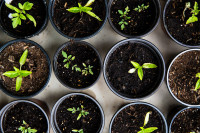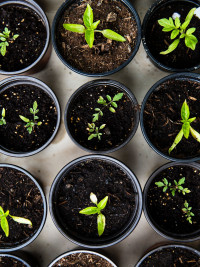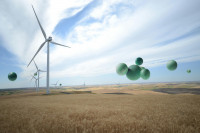New Eco-Friendly Economy
by Daniel Schlee

Consumers are becoming increasingly aware of the importance of an intact planet. How do companies manage to satisfy the desire for conscious consumption and take responsibility for the effects of their actions in a way that makes economic sense? How do environmental awareness and sales growth go together?
The "Overview Effect" refers to the change of mind of space travelers when they see the Earth as a whole for the first time. This is usually accompanied by a feeling of awe and connection with all life on our planet. Images of climate change and the Corona pandemic create a similar global awareness in people.
What does this do to consumers? Among them, there is a growing awareness of the importance of an intact planet, a desire to live responsibly, and a willingness to consume sustainably.
How do companies manage to comply with this and take responsibility for the effects of their actions in a way that makes economic sense? How do sales growth and environmental protection go hand in hand? How must our economic system change in order to remain sustainable? The concept of Futures Thinking offers assistance in answering these questions.
Futures Thinking - from the present to valuable future scenarios
Companies that want to drive a fundamental change in their business model toward true sustainability need new thought processes and new tools.
Decision makers can often only predict the future as a forecast by reflecting on the past and thus do not move forward. Established tools can hardly counter this problem. For example, design thinking as an innovation method focuses on current needs. But how do you profitably move from the present into the future and act immediately?
With Futures Thinking, companies go in search of answers to complex, speculative and forward-looking questions: How can we make the future tangible for us? How can we actively shape corporate welfare with a view to sustainability and new value creation processes? How can we become active as a company in a complex world and leverage innovation potential to sustainably increase our own relevance?
Through co-creative and cooperative innovation methods, Futures Thinking examines the possibilities from what is feasible today to what is possible and translates them into action.
Systematically developing possible futures.
The focus of Futures Thinking is the systematic development of scenarios from which we derive concrete implications and actions for the entrepreneurial present and thus create the basis for long-term directional decisions. The framework used here is TAIDA: track - analyze - imagine - decide - act.
TAIDA promotes strategic dialog between innovation departments, product developers, researchers and decision-makers. Thinking about tomorrow in a collaborative process creates a common vision. It connects people in the company across disciplines and professional purposes and creates a common "dream" as a guiding star that channels and lifts forces in the company.
On the way to the New Eco-Friendly Economy
New markets, new values, new economy, new environment. These dimensions give rise to a possibility space within which scenarios can emerge that bring environmental protection and sales growth into a sustainable balance.
We discussed these opportunities together with experts from a wide range of companies and industries in an Opportunity Lab and developed individual practical starting points for each of them. Three primary fields of action emerged:
First - Building Sustainability Competence:
Dealing with sustainability challenges represents a huge educational task for companies and consumers. We need to learn what sustainability means in concrete terms in our living situation or for our working environment, how to measure it and how to optimize it. The new debate must be called "sustainability competence," as urgently as the old one was called "media competence."
Second - Reduce complexity:
Companies will become "complexity reducers" when it comes to sustainability. Their task will be to implement the new legal framework and requirements for consumers in a way that does not overburden them or result in losses. In this role, companies will help consumers to carefully guide their consumption decisions in the right direction, for example through purchasing incentives, advisory services (apps) or new quality standards.
Third - Promote circular economy:
If companies assume responsibility for the entire life cycle, they must almost automatically also take the path toward a circular economy. This means that "after sales" and corresponding after-sales services (updates, repairs, additional packages) in particular become more important. They hold great potential for companies to profitably expand their customer relationships.
diffferent Opportunity Labs
We firmly believe that it takes different perspectives and a smart meshing of practical and theoretical knowledge to approach the future. That's why we host practice-oriented think labs - Opportunity Labs - where we test the viability of current buzzwords and look for real solutions behind the hypes.


